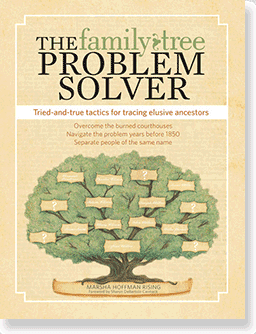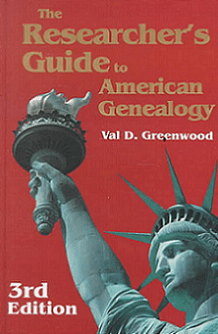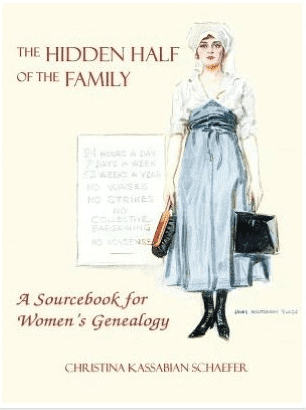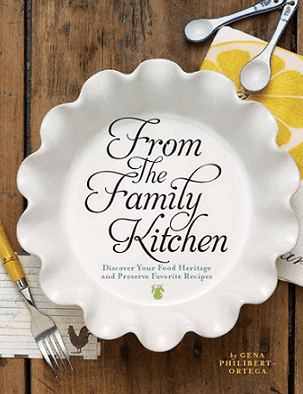Introduction: In this article, to help celebrate Women’s History Month, Gena Philibert-Ortega shares some of her favorite genealogy books that help her research her female ancestors. Gena is a genealogist and author of the book “From the Family Kitchen.”
It’s good to adopt the philosophy of continuing education when approaching your genealogy. Obviously, your continuing education can take on many forms, such as blogs, webinars, conferences, online courses, and more. I am a big fan of learning more using those outlets – but I must admit that books are one of my favorite places to learn new-to-me research techniques.
Do you have a genealogy library? The following are some books to add to your personal library that can assist you in tackling your toughest female ancestor brick walls. These are books I not only recommend, but I turn to time and time again for my own genealogical research. Because researching female ancestors can be difficult, it’s a good idea to learn as much about good research techniques, available records, how the laws affected women, and how to use social history in our genealogy as we can.
The Family Tree Problem Solver by Marsha Hoffman Rising
The Family Tree Problem Solver is the one book that I tell all family historians they must own. Every genealogist should have at least a few general research books, and this must be one of them. (I love this book so much I have a copy of both editions!) In these pages you will find various problem-solving techniques for brick walls, including per-1850 ancestors and same name ancestors. You will learn how to find records in places where the records were destroyed, how to research collateral relatives, and finding those ancestors who are missing on the census. Not really a beginning how-to genealogy book, it will be of greater assistance to those who have a basic understanding of the fundamentals but need to learn more research techniques and resources.
The Researcher’s Guide to American Genealogy, Third Edition by Val D. Greenwood
Anytime you research, you need to have a solid foundation to better understand the basics and what resources provide what information. You also need to be able to know where to find what you need. The Researcher’s Guide to American Genealogy is that book. It is a good book for the beginner to learn the basics, but it’s appropriate for the more intermediate student of genealogy to better understand what records exist. What I most like about this book is it is comprehensive in its survey of the study of genealogy, not only explaining records but exploring topics like handwriting, evidence analysis, and how to research in a library.
Now you may be wondering why I’m recommending a book that has seemingly nothing to do with female ancestors. You must truly understand what records answer what research questions in your effort to conduct a reasonably exhaustive search before you focus in on documenting your female ancestor’s life. This knowledge will come with a careful study of this book.
The Hidden Half of the Family: A Sourcebook for Women’s Genealogy by Christina Schaefer
One of my favorite genealogy authors has the most unique book looking at researching female ancestors. Instead of just exploring tips or resources, The Hidden Half of the Family looks at the law in each U.S. state. Remember this is a “sourcebook,” not really a how-to book, so each state is represented with information about the laws that affected our female ancestors (when could they vote, petition for divorce, own property, etc.). It’s your job to read that information and then do a search of genealogy websites, libraries, and archives to find where the documents exist. This book also includes a timeline of important historical dates for women, a glossary and bibliography, as well as how to find women in records.
Now you may be looking at the copyright date for this book and saying, “But Gena, this book is copyrighted 1999 – a lot has happened in genealogy since then!” Yes, you’re absolutely right, but the value of this book is in the historical information provided about each state. Once you know this information, you can then search for the appropriate records.
From the Family Kitchen: Discover Your Food Heritage and Preserve Favorite Recipes by Gena Philibert-Ortega
Ok, I admit this is a little self-serving: it’s a shameless plug for my own book! But part of researching female ancestors is understanding their social history. Social history is how history and life affected the everyday person. Food is an important part of women’s social history.
How can a book about food history help your family history? While gathering names, dates, and places are an important part of genealogy, it’s also important to really understand our ancestors. Food history is one way to better understand and share our family history.
In this book, you’ll learn about food history and the food of your ancestors, including some examples of older recipes. You can then use it to document recipes from you and your female ancestors. This is a great family history project that provides one way to introduce female ancestors to the younger generation who may not be as interested in “genealogy.”
What Are Your Favorite Genealogy Books?
Do you have any of these books? What’s your favorite? What’s a favorite on your bookshelf that I missed?




